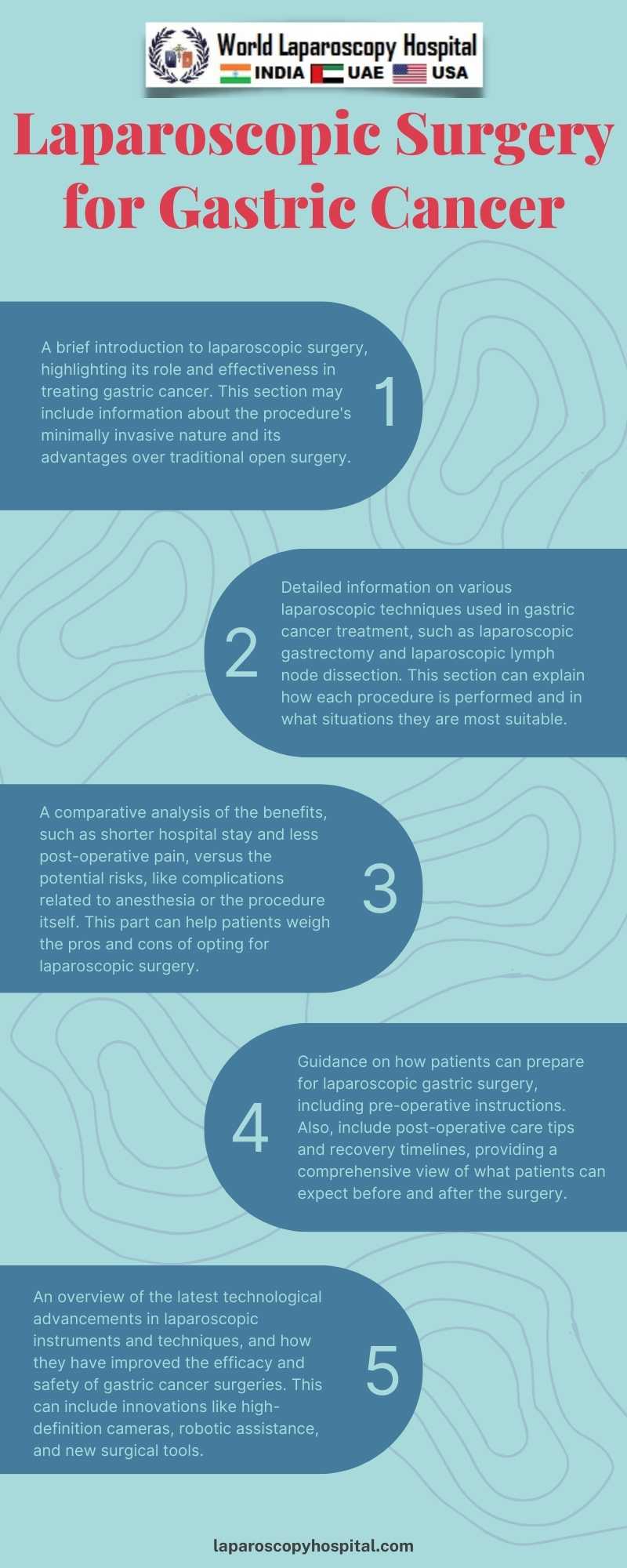Patient Outcomes: Laparoscopic Surgery for Gastric Cancer
Patient outcomes following laparoscopic surgery for gastric cancer have become a topic of increasing interest in the medical community. This article will delve into the advancements and challenges in laparoscopic techniques for treating gastric cancer, focusing on patient outcomes.

Evolution of Laparoscopic Surgery in Gastric Cancer Treatment
Laparoscopic surgery, a minimally invasive technique, has seen significant advancements over the past few decades. Initially utilized for simpler procedures, its application in complex surgeries like gastric cancer resection demonstrates the progress in surgical technology and technique. This evolution is marked by enhanced precision and reduced trauma to the patient, leading to a shift in the surgical management of gastric cancer.
Comparing Laparoscopic and Traditional Open Surgery
The traditional approach to gastric cancer surgery has been open surgery. However, with laparoscopic methods, there are key differences that potentially benefit the patient. These include smaller incisions, reduced blood loss, and lower postoperative pain. However, the technical complexity of laparoscopic procedures requires a high degree of skill and experience from the surgeon.
Patient Outcomes: Recovery and Survival Rates
One of the primary advantages of laparoscopic surgery for gastric cancer is the reduced recovery time. Patients often experience shorter hospital stays and a quicker return to daily activities. Additionally, the risk of postoperative complications, such as infections and hernias, is generally lower compared to open surgery.
In terms of long-term survival rates, studies have shown comparable outcomes between laparoscopic and open surgeries for early-stage gastric cancer. However, for advanced stages, the data is still evolving, and long-term studies are needed to draw definitive conclusions.
Quality of Life Post-Surgery
Quality of life post-surgery is a crucial consideration. Patients undergoing laparoscopic surgery often report higher satisfaction levels, attributed to lesser pain and scarring. Furthermore, this approach can be particularly beneficial for elderly patients or those with comorbidities, where a less invasive procedure can reduce overall stress on the body.
Challenges and Considerations
Despite the advantages, laparoscopic surgery for gastric cancer is not without challenges. The procedure demands high technical expertise and experience, which can limit its availability. Moreover, the long-term oncological outcomes, particularly in advanced gastric cancer, require further research to establish the efficacy of laparoscopic methods over traditional surgery.
Conclusion
Laparoscopic surgery for gastric cancer represents a significant advancement in surgical oncology, offering benefits like reduced recovery time and potentially improved quality of life. As surgical techniques continue to evolve, it is crucial to balance innovation with patient safety and outcomes. Ongoing research and clinical trials will be pivotal in shaping the future of gastric cancer treatment, ensuring that patients receive the most effective and least invasive treatment possible.

Evolution of Laparoscopic Surgery in Gastric Cancer Treatment
Laparoscopic surgery, a minimally invasive technique, has seen significant advancements over the past few decades. Initially utilized for simpler procedures, its application in complex surgeries like gastric cancer resection demonstrates the progress in surgical technology and technique. This evolution is marked by enhanced precision and reduced trauma to the patient, leading to a shift in the surgical management of gastric cancer.
Comparing Laparoscopic and Traditional Open Surgery
The traditional approach to gastric cancer surgery has been open surgery. However, with laparoscopic methods, there are key differences that potentially benefit the patient. These include smaller incisions, reduced blood loss, and lower postoperative pain. However, the technical complexity of laparoscopic procedures requires a high degree of skill and experience from the surgeon.
Patient Outcomes: Recovery and Survival Rates
One of the primary advantages of laparoscopic surgery for gastric cancer is the reduced recovery time. Patients often experience shorter hospital stays and a quicker return to daily activities. Additionally, the risk of postoperative complications, such as infections and hernias, is generally lower compared to open surgery.
In terms of long-term survival rates, studies have shown comparable outcomes between laparoscopic and open surgeries for early-stage gastric cancer. However, for advanced stages, the data is still evolving, and long-term studies are needed to draw definitive conclusions.
Quality of Life Post-Surgery
Quality of life post-surgery is a crucial consideration. Patients undergoing laparoscopic surgery often report higher satisfaction levels, attributed to lesser pain and scarring. Furthermore, this approach can be particularly beneficial for elderly patients or those with comorbidities, where a less invasive procedure can reduce overall stress on the body.
Challenges and Considerations
Despite the advantages, laparoscopic surgery for gastric cancer is not without challenges. The procedure demands high technical expertise and experience, which can limit its availability. Moreover, the long-term oncological outcomes, particularly in advanced gastric cancer, require further research to establish the efficacy of laparoscopic methods over traditional surgery.
Conclusion
Laparoscopic surgery for gastric cancer represents a significant advancement in surgical oncology, offering benefits like reduced recovery time and potentially improved quality of life. As surgical techniques continue to evolve, it is crucial to balance innovation with patient safety and outcomes. Ongoing research and clinical trials will be pivotal in shaping the future of gastric cancer treatment, ensuring that patients receive the most effective and least invasive treatment possible.
2 COMMENTS
Dr. Ankit Jangid
#1
Dec 25th, 2023 7:42 pm
Laparoscopic surgery for gastric cancer is a pivotal advancement in surgical oncology, promising reduced recovery time and potential quality of life enhancements. Evolving techniques require a delicate balance of innovation, patient safety, and outcomes. Ongoing research and trials will shape the future of gastric cancer treatment, prioritizing effectiveness and minimally invasive approaches.
Dr. Ram Gozon
#2
Jan 4th, 2024 8:07 am
Laparoscopic surgery for gastric cancer is a pivotal advancement in surgical oncology, providing benefits such as reduced recovery time and potentially improved quality of life. Balancing innovation with patient safety and outcomes is crucial as surgical techniques evolve. Ongoing research and clinical trials will shape the future of gastric cancer treatment, ensuring patients receive the most effective and least invasive options available.
| Older Post | Home | Newer Post |





